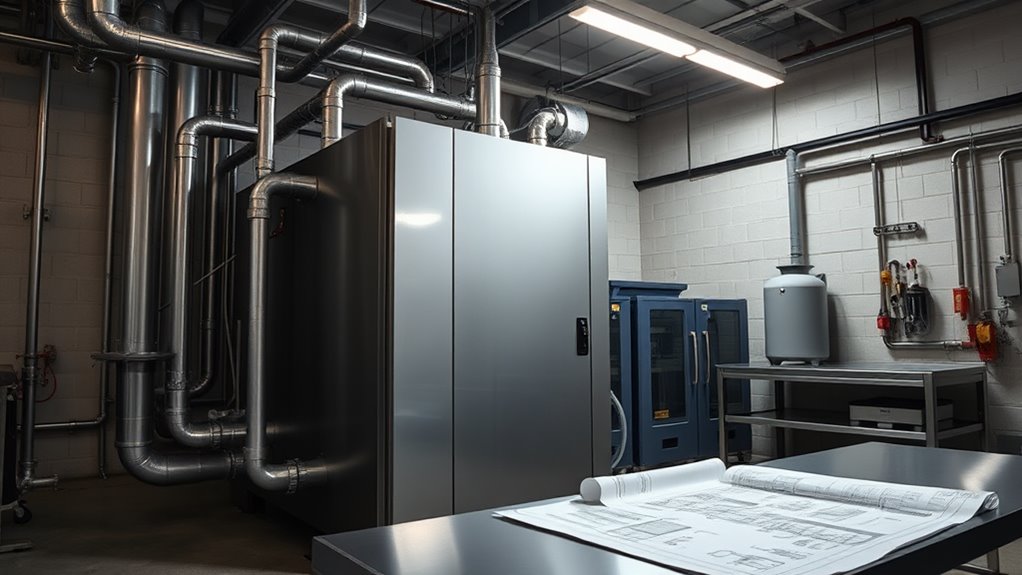Installing a commercial boiler can cost between $5,000 and $100,000, influenced by factors like boiler type, installation complexity, and site conditions. For instance, fire-tube boilers are more affordable, while water-tube boilers cater to high-capacity needs at a premium. Additional costs may arise from permits and inspections, alongside ongoing maintenance for peak performance. Understanding these elements helps you make informed decisions about your installation. There's more to take into account to guarantee you budget effectively for your project.
Key insights
- Installation costs vary significantly based on boiler type, ranging from $5,000 for fire-tube boilers to $100,000 for water-tube boilers.
- Complexity of installation and site accessibility are crucial factors that can increase overall expenses.
- Additional costs may arise from permits, inspections, and retrofitting existing infrastructure.
- Budgeting for regular maintenance and unexpected repairs is essential to avoid future disruptions and ensure efficiency.
- Setting aside a contingency fund of 10-15% of the total budget is recommended for unforeseen issues during installation.
Understanding Commercial Boilers
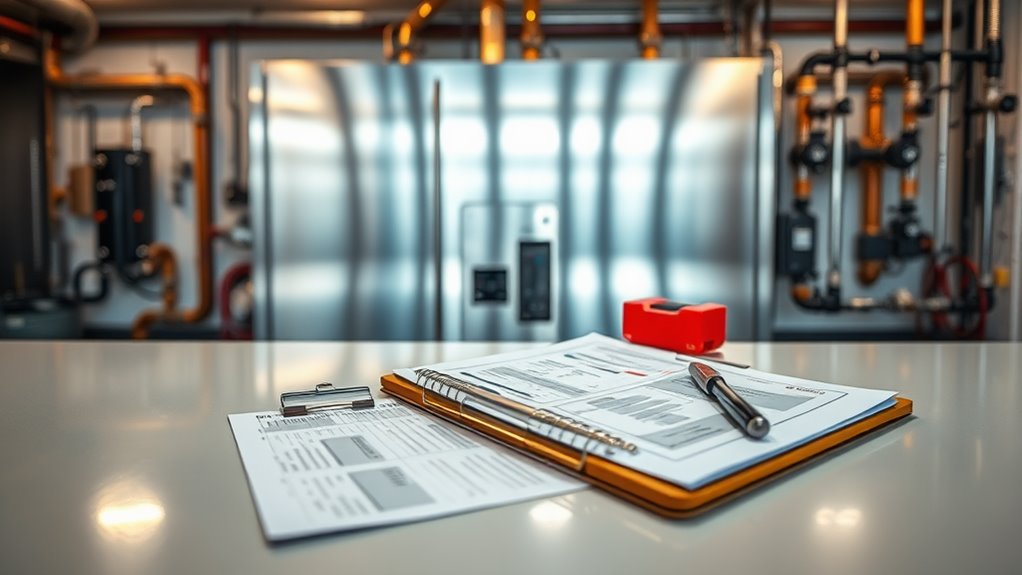
When considering a commercial boiler, it is vital to grasp its key components and functionalities. A commercial boiler primarily consists of a combustion chamber, heat exchanger, and controls. The combustion chamber ignites fuel, generating heat, while the heat exchanger transfers this heat to water or steam. Understanding boiler efficiency is fundamental, as it directly impacts energy consumption. Higher efficiency boilers utilize advanced technologies, minimizing fuel usage and reducing operational costs. You should also consider the boiler's capacity, as it determines how well it meets your facility's heating demands. Regular maintenance guarantees peak performance, prolonging the boiler's lifespan and maintaining efficiency. Additionally, compliance with safety regulations ensures that the installation and operation of your commercial boiler meet necessary safety standards. By thoroughly understanding these elements, you can make informed decisions regarding your commercial heating solutions.
Factors That Affect Installation Costs
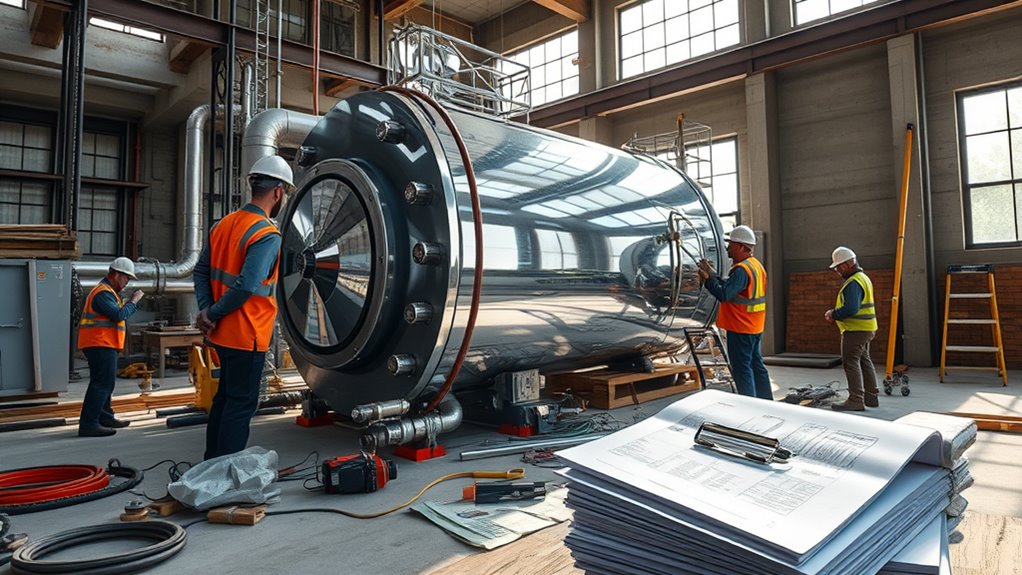
When considering the installation of a commercial boiler, several key factors will influence overall costs. Your choice of boiler type can greatly impact pricing, along with the complexity of the installation process. Additionally, the location and accessibility of the installation site will play vital roles in determining the final expense. Furthermore, regular servicing is crucial for ensuring optimal boiler performance and longevity, which can also affect initial installation decisions.
Boiler Type Selection
Selecting the right boiler type is essential, as it greatly impacts installation costs and long-term efficiency. Your choices include condensing, non-condensing, and biomass boilers, each with distinct advantages and drawbacks. Boiler efficiency is a critical factor; higher efficiency often means lower operational costs, but it may come with a higher upfront price. Additionally, consider the fuel options available in your area—natural gas, oil, or electricity—since these can influence both installation and ongoing expenses. Each fuel type presents unique installation requirements and costs, which can considerably affect your budget. Ultimately, aligning your boiler selection with your operational needs and fuel availability will help guarantee a cost-effective and efficient heating solution for your commercial space. Furthermore, choosing energy-efficient heating systems can significantly reduce your carbon footprint and lower operational expenses.
Installation Complexity Level
After determining the appropriate boiler type, it's important to evaluate the installation complexity level, which can greatly influence overall costs. Various factors contribute to the complexity, and addressing them early can help you avoid unexpected expenses.
- Installation challenges: Consider any unique requirements or obstacles that may arise during the installation process.
- Existing infrastructure: Assess how well your current setup accommodates the new boiler, as retrofitting can increase costs.
- Skilled labor: The availability of experienced technicians can affect both installation timelines and labor costs. Regular maintenance is crucial for ensuring the optimal condition of the boiler and avoiding complications during installation.
Location and Accessibility
Location and accessibility play an essential role in determining the installation costs of a commercial boiler. When evaluating site preparation, you'll need to take into account the physical space available for the boiler and any necessary modifications to accommodate it. Limited access can considerably increase labor costs, as technicians may face challenges maneuvering equipment through tight spaces or circumventing obstacles. Additionally, if your site requires extensive site preparation—such as leveling the ground or ensuring adequate ventilation—this will further impact your budget. It's important to assess access considerations, including proximity to utilities and clearance regulations, as these factors can lead to unexpected expenses and delays during installation. As a result, understanding your location's specific requirements is fundamental for accurate cost estimation. Moreover, considering the energy-efficient heating and cooling solution can help you choose a system that aligns with your operational needs and budget.
Types of Commercial Boilers and Their Prices
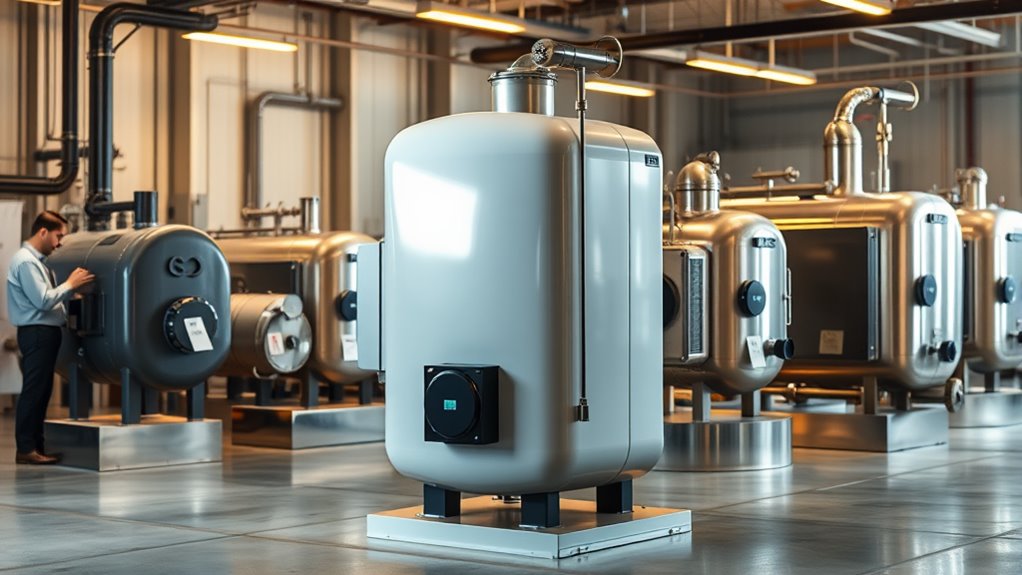
When choosing a commercial boiler, it is essential to understand the various types available and their respective price ranges, as this can greatly affect your operational efficiency and budget. Here's a brief overview of common boiler types along with their price ranges:
- Fire-tube Boilers: Typically priced between $5,000 and $20,000, suitable for low-pressure applications.
- Water-tube Boilers: More expensive, ranging from $25,000 to $100,000, ideal for high-capacity needs.
- Condensing Boilers: Priced around $15,000 to $50,000, these are energy-efficient and can lower operating costs. Regular maintenance and servicing is crucial to ensure the optimal performance of your boiler system.
When conducting a price comparison, consider installation and maintenance costs, as they can vary considerably depending on the boiler type you choose.
Size Matters: Calculating the Right Boiler Capacity
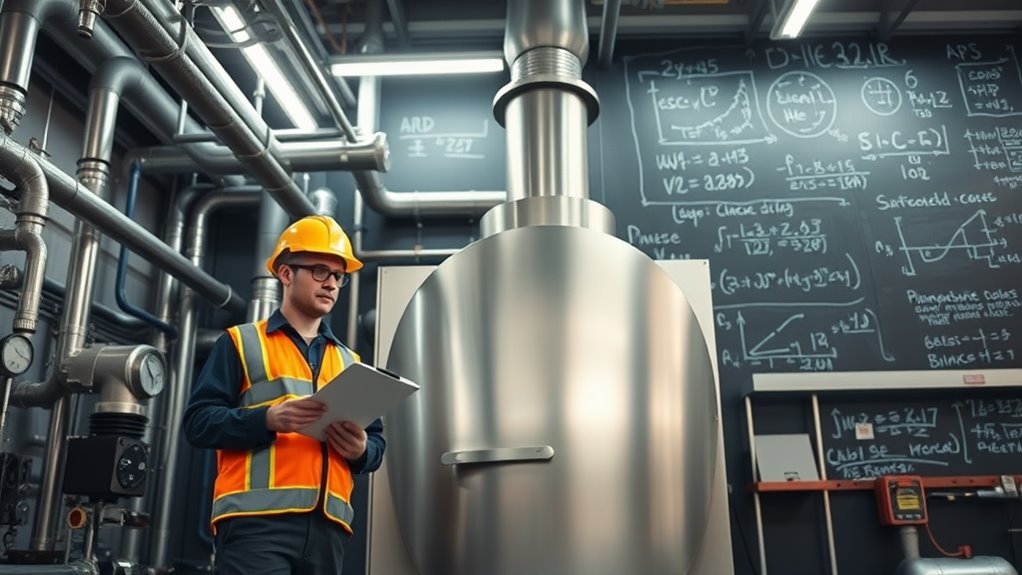
When selecting a commercial boiler, understanding size guidelines is essential for ideal performance. You'll need to apply specific capacity calculation methods to guarantee the unit meets your facility's heating demands efficiently. An accurately sized boiler not only improves energy efficiency but also minimizes operational costs. Regular maintenance, including commercial power flush services, can further enhance system performance and longevity.
Boiler Size Guidelines
Selecting the right boiler size is essential for optimizing efficiency and guaranteeing consistent heating in a commercial space. Proper boiler sizing involves conducting a thorough load analysis to determine the heating needs accurately. Here are key factors to take into account:
- Heat Loss: Calculate the heat loss of your building to understand how much capacity you need.
- Peak Demand: Identify peak heating demand times to guarantee the boiler can handle maximum load efficiently.
- Future Expansion: Reflect on potential future expansions in your commercial space that may increase heating requirements. Regular maintenance helps prevent low water pressure issues, which can be exacerbated by improper sizing.
Capacity Calculation Methods
To guarantee your commercial boiler meets the specific heating demands of your space, you'll need to employ precise capacity calculation methods. Start with a thorough load calculation, which assesses the heat loss and gain within your building. This involves factoring in variables such as insulation quality, square footage, and the number of windows. Once you've completed this assessment, you can proceed with capacity estimation. This estimation determines the BTU output required for your boiler to efficiently heat your facility. Remember, overestimating can lead to excessive energy costs, while underestimating could leave you with inadequate heating. By using these methods, you'll make certain your boiler operates effectively, maximizing both performance and energy efficiency. Additionally, ensuring compliance with Commercial Gas Safety Certificate regulations is crucial for the safe operation of your gas appliances.
Installation Costs: What to Expect
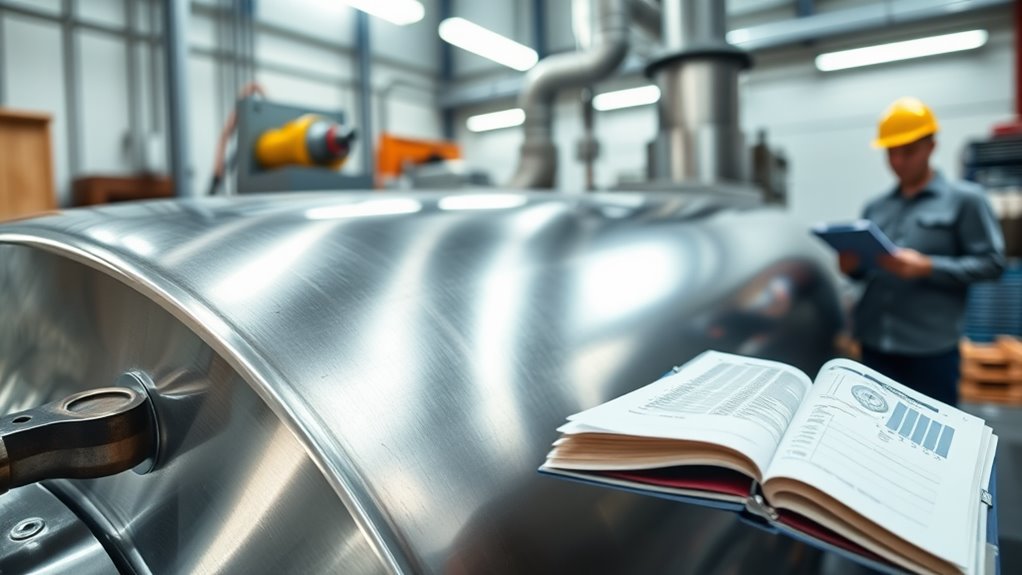
Understanding the installation costs of a commercial boiler is essential for effective budgeting and planning. Various factors influence these costs, including:
- The type and capacity of the boiler
- Labor costs and installation timeline
- Additional components, such as piping and controls
You should expect the installation to take anywhere from a few days to several weeks, depending on your specific requirements. Financing options are available to help manage these expenses, allowing you to invest in energy-efficient solutions without straining your budget. By estimating installation costs accurately, you can guarantee a smoother project execution and avoid unexpected financial burdens. Always consult with a professional to assess your needs and obtain a detailed quote tailored to your commercial space. Additionally, understanding error codes can help you identify potential issues after installation, ensuring optimal performance and reliability.
Maintenance and Operational Costs
Once your commercial boiler is installed, it's important to contemplate the ongoing maintenance and operational costs that come with it. Regular boiler maintenance is essential to guarantee peak performance and prolong the lifespan of your system. This includes routine inspections, cleaning, and necessary repairs, which can vary in cost based on the complexity of your system.
Operational efficiency also plays a significant role in your overall expenses. A well-maintained boiler operates more efficiently, reducing fuel costs and minimizing energy waste. You should budget for both scheduled maintenance and unexpected repairs to avoid disruptions. By prioritizing these costs, you can enhance the reliability of your boiler while keeping your operational expenses in check.
Additional Expenses to Consider
While you may have accounted for the primary installation costs of your commercial boiler, it's crucial to recognize other potential expenses that could arise throughout its lifecycle. These additional costs can impact your budget considerably:
- Installation permits: Depending on your local regulations, you might need various permits, which can add to your upfront expenses.
- Unexpected repairs: Boilers can experience unforeseen issues, requiring immediate repairs that could strain your finances.
- Upgrades: As technology evolves, you might need to invest in upgrades to maintain efficiency and compliance with industry standards.
Tips for Budgeting Your Commercial Boiler Installation
When planning your commercial boiler installation, it's essential to create a thorough budget that accounts for both expected and unexpected costs. Start by employing effective budgeting strategies; gather detailed cost estimates that include equipment, installation, and labor. Don't forget to factor in additional expenses like permits, inspections, and potential upgrades to existing infrastructure. Consult with professionals to obtain accurate quotes, as their expertise will help refine your cost estimation. Consider setting aside a contingency fund—typically 10-15% of your total budget—to cover unforeseen issues that may arise during installation. By being proactive and detailed in your budgeting approach, you'll guarantee a smoother installation process and better manage your financial resources.
Frequently Asked Questions
How Long Does a Commercial Boiler Installation Typically Take?
When you're considering a commercial boiler installation, the timeline can vary based on several factors, including the boiler types and the complexity of the project. Typically, you can expect the installation to take anywhere from a few days to a couple of weeks. Factors like site preparation, existing infrastructure, and local regulations can influence this installation timeline. Proper planning and coordination with professionals can help guarantee a smoother process and minimize delays.
Are Permits Required for Commercial Boiler Installation?
Yes, permits are typically required for commercial boiler installation. You'll need to check local installation regulations, as these can vary by location. Common permit types include mechanical, plumbing, and building permits. Obtaining these permits guarantees compliance with safety standards and codes, minimizing legal risks. It's crucial to engage with local authorities early in the process to guarantee all necessary documentation is in place before beginning installation.
Can I Install a Boiler Myself to Save Costs?
You might consider DIY installation to achieve cost savings on your boiler project. However, it's essential to understand the technical complexities involved. Boiler systems require precise fitting and adherence to safety regulations. If you're not experienced in plumbing or HVAC systems, you could face significant risks, including improper installation or voiding warranties. It's often wiser to hire a licensed professional to guarantee efficiency and compliance with local codes, despite the higher initial expense.
What Warranties Are Commonly Offered With Commercial Boilers?
When considering commercial boilers, you'll often find warranties that offer varying levels of warranty coverage. Typically, manufacturers provide warranties that cover parts for one to five years, with some components, like heat exchangers, enjoying extended coverage. Additionally, many companies offer maintenance plans that can enhance your warranty by ensuring regular service and inspections. It's essential to thoroughly review these options to protect your investment and maintain peak boiler performance over time.
How Can I Find a Reputable Boiler Installation Contractor?
To find a reputable boiler installation contractor, start by checking contractor qualifications, confirming they have relevant certifications and experience. Look for installation reviews online, focusing on customer feedback and ratings. Request references from potential contractors to gauge their reliability and expertise. It's also wise to compare quotes and services offered by different contractors, helping you make an informed decision. A thorough vetting process guarantees you choose a skilled professional for your installation needs.
Summary
In summary, installing a commercial boiler involves several cost factors, from the type and size to installation specifics. By understanding these elements, you can budget effectively and guarantee you select the right system for your needs. Remember to factor in ongoing maintenance and operational costs to avoid unexpected expenses down the line. With careful planning and research, you can achieve a cost-effective solution that meets your heating requirements while maximizing efficiency and longevity.

